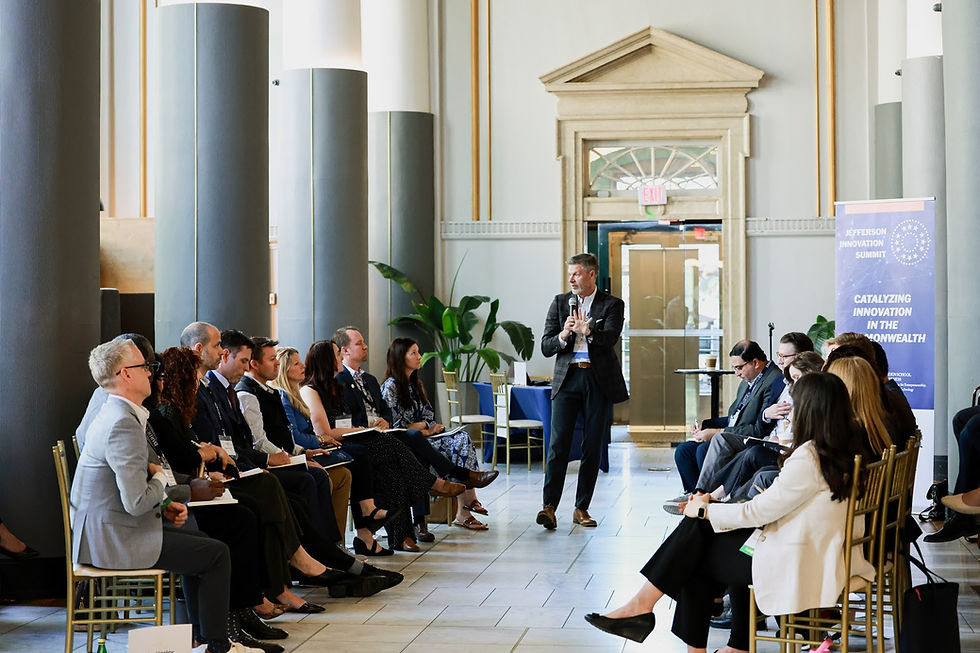Virtual Roundtable: Justice
- Tom Tom Foundation Staff

- Jun 3, 2020
- 2 min read
Updated: Aug 25, 2020
The Path to a More Just Charlottesville in the Wake of Covid-19
In collaboration with C-VILLE Weekly, we hosted another Virtual Roundtable conversation — this time with a hometown focus. We convened several Charlottesville-based justice reform leaders and advocates, all of whom are working tirelessly to protect the incarcerated and ensure those reentering society are prepared for success. Watch the full conversation and see a few highlights from our discussion below. Be sure to check out the full C-VILLE Weekly article for more details.
Participants
Tierney Fairchild, Executive Director, Resilience Education
Harold Folley, Community Organizer, Legal Aid Justice Center
Cherry Henley, Director, Lending Hands
Jim Hingeley, Commonwealth’s Attorney, Albemarle County
Hollie Lee, Chief of Workforce Development Strategies, City of Charlottesville
Whitmore Merrick, Home to Hope Peer Navigator, City of Charlottesville
Joseph Platania, Commonwealth’s Attorney, City of Charlottesville
Martize Tolbert, Client Partner Navigator, The Fountain Fund
Erika Viccellio, Executive Director, The Fountain Fund
Tom Tom Foundation
Rachel Baker, Summit Director
Ben Wilkes, Program Manager (facilitator)
C-VILLE Weekly
Ben Hitchcock, News Reporter
“It’s a shame that it took this crisis to motivate the community to get behind decarceration, but it’s happened now, and when the crisis has passed, we’re going to work to continue doing this.” –Jim Hingeley
Across the country, communities have had to adapt and prioritize health in the wake of Covid-19. Like many other localities, Charlottesville has begun to see policy changes surrounding the criminal justice sphere, many of which advocates have been pushing for all along. In our conversation, the group discussed these new changes and the potential for continued reform. As one example, after transferring approximately 15% of its pre-Covid population to home electronic incarceration (house arrest), the Albemarle Charlottesville Regional Jail has reported no cases of Covid-19 as of this conversation. What’s more, out of those that were released, none have committed new criminal offenses. By comparison, the state prison system opted to transfer less than 1% of its 30,000 prisoners to house arrest, and has reported over 1,100 cases of the virus within their facilities. These are the exact results that our decarceration activists were expecting, and that those in our Roundtable continue to vocalize — that we can protect and value the lives of incarcerated individuals while keeping our society safe.
However, there is never one easy fix. Many of those that are on house arrest still struggle to find housing and job opportunities, and the rising numbers are putting pressure on organizations that provide reentry resources and support. Issues surrounding successful reentry will require our continued attention once Covid-19 is behind us.
“Let’s talk about things that we can radically do now. Programs over prisons. Now is the time to [be] thought-provoking, to try to figure out institutions that we can use here in Charlottesville.” –Martize Tolbert
All of our panelists concluded on one shared sentiment: it may have taken a pandemic to kick start these changes, but the work is far from over. While progress is being made, community advocacy is needed now more than ever. Check out our list of Justice Reform Resources for ways to get involved.




